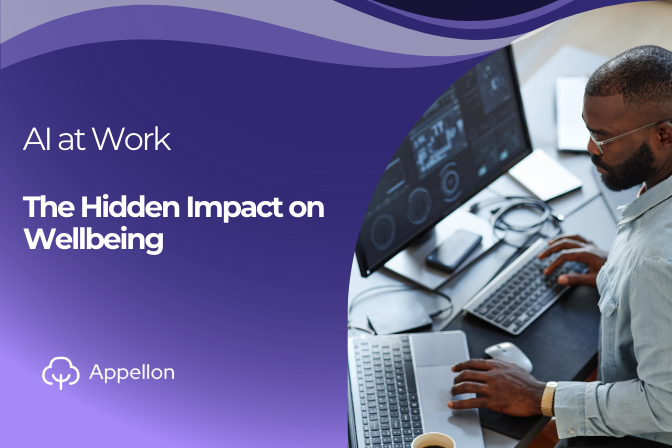Automation isn’t the problem, attitudes are.
Artificial Intelligence (AI) has become the most talked-about workplace tool in recent years. It promises efficiency, speed, and scale. Yet behind the buzz lies a critical question: Is AI improving employee wellbeing or quietly eroding it?
The Double-Edged Sword of AI
There’s no doubt AI boosts productivity. But when rolled out without cultural design, it introduces new risks.
- Fear of replacement replaces empowerment.
- Output is squeezed rather than human creativity unleashed.
- Connection shrinks as conversations are replaced with commands.
The truth? AI itself isn’t the problem, it’s the mindset surrounding it.
Appellon Principle:
“AI doesn’t erode wellbeing, attitudes towards AI do.”
Why AI and Wellbeing Collide
Too often, leaders view AI as a cost-saving lever. Without wellbeing in the design, this creates anxiety, distrust, and workloads that grow rather than shrink.
Instead of freeing people, AI wires workforces for cortisol stress, fear, competition instead of oxytocin trust, connection, and progress.
Appellon Principle:
“AI without cultural design doesn’t save time, it steals resilience.”
What Works Instead
The opportunity lies in how we design the culture around AI:
- Frame AI as a partner, not a threat.
- Automate draining tasks so people can focus on meaningful work.
- Use psych-tech platforms like Appellon to reinforce behaviours in real time, so progress and wellbeing grow together.
The organisations that flourish with AI aren’t the ones adopting the fastest. They’re the ones introducing it as a wellbeing partner.
🧬 The Appellon Methodology
At Appellon, we believe AI isn’t about replacing people it’s about renormalising workplace culture so people can thrive alongside technology.
Our methodology focuses on three critical dimensions:
- Tech-driven coaching: Personalised, adaptive insights that support leaders and teams as they integrate AI into workflows.
- 10-minute micro-learnings: Bite-sized, engaging lessons designed to reframe attitudes towards technology and wellbeing.
- Real-time behaviour reinforcement: Because change isn’t an event it’s a practice. We hardwire progress and connection into daily work.
By shifting workforces from cortisol-driven stress to oxytocin-driven connection and progress, the Appellon Methodology ensures that AI adoption strengthens resilience, boosts wellbeing, and delivers measurable performance outcomes.
